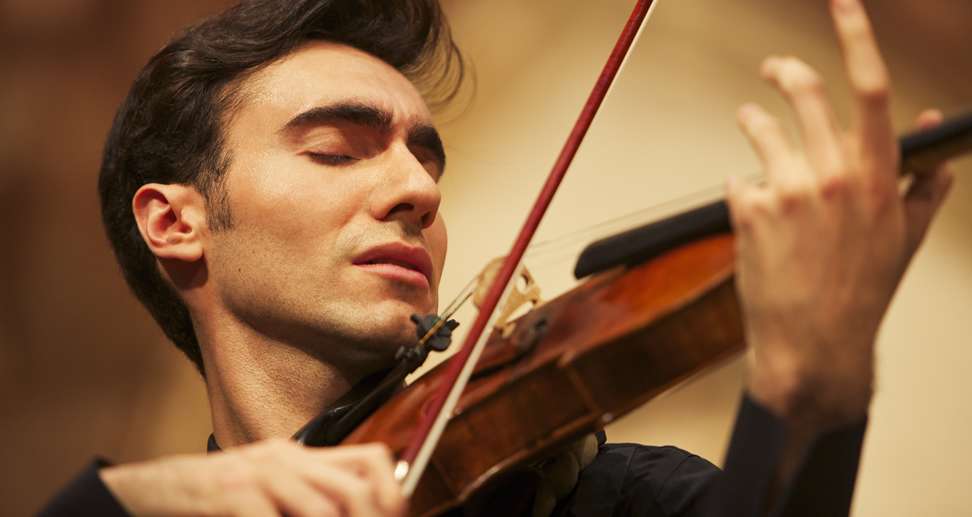|
Back
The Miracle of Mr. Carpenter New York
Isaac Stern Auditorium, Carnegie Hall
05/11/2013 -
“Spring For Music”: “A Tribute To Slava”
Rodion Shchedrin: Slava, Slava (A Festival Ringing of Bells ) (New York Premiere)
Alfred Schnittke: Viola Concerto
Dmitri Shostakovich: Symphony Number 5 in D Minor, Opus 47
David Aaron Carpenter (Viola)
National Symphony Orchestra, Christoph Eschenbach (Music director/Conductor

C. Eschenbach (©Eric Brissaud)
My one meeting with Mstislav Rostropovich came after his Hong Kong concert. A half dozen of us took him to a tiny island for seafood and drinks. “Slava” (nobody ever called him Mister Rostropovich) provided not only the vodka but the endless bear hugs, stories both salacious and scintillating (most unrepeatable in this family column), and was such a gregarious, generous person that one almost forgot that he was perhaps the finest cellist alive at that time.
But Slava did something else out of the ordinary. Washington D.C. was perhaps the only capital of a major cultural country whose orchestra was as insignificant as...well, as insignificant as the I. Q. of its lawmakers. When Slava became its unlikely Musical Director in 1977, he not only turned the orchestra around, but by his retirement in 1994, he had made it a credit to America itself.
One still doesn’t instinctively mention the National Symphony in the pantheon of New York, Chicago, Philadelphia or Los Angeles. But the Rostropovich glow has remained on its string section, its energy and passion. This concert, the finale from the week of visiting orchestras, had an audience of Washingtonians, but they were light years away from the feverish patriots of Detroit and Buffalo. They sat stiffly on their seats, and torpidly waved their D.C. bandanas. It took the orchestra to provide the energy.
All three composers were influenced and inspired by Rostropovich, and all three shared, in varying quantities, a hatred of Josef Stalin. Rodion Shchedrin, who has composed some of the ebullient and funny Russian music, showed his contempt with the Stalin Cocktail. But in the short Slava, Slava – one “Slava” for Rostropovich, the other for the Russian word “glory” –, he did the very Russian thing of celebrating with bells. Not, alas, the great bells of Moscow or Georgia or the fabulous Byzantine cathedrals. Here, tubular bells and gongs were a satisfactory enough facsimile for the concert hall.
It was decidedly a pièce d’occasion , but was a resonant introduction to two more substantial works.
Alfred Schnittke had met Rostropovich late in life, but the cellist had inspired the composer to compose several pieces for him, as well as this amazing Viola Concerto. One always feels, with Schnittke, that the major works have already been heard, but this work was new to me. It was written only two weeks before a series of strokes, illnesses which changed his mode of composition but never his originality.
This Concerto is a fierce, almost cutthroat work for any soloist. While he wrote for Yuri Bashmet (with the name Bashmet encoded into one of the themes), Bashnet’s own student, David Aaron Carpenter, gave it a reading where every cluster note, every microtone, all the relentlessly driving music was played hypnotizing power.

D. A. Carpenter (© www.davidaaroncarpenter.com)
I had last heard Mr. Carpenter in a program devoted totally to the viola at the Met Museum of Art, and was astounded then at his power (read ici
Yet with Schnittke, one never hears technique for its own sake, and these movements both were quirky, always surprising. Not as much, though, as the middle fast movement, where Schnittke made his viola fight with the orchestra alarmingly. They were playing a kitschy waltz, horrible piccolo tweets, mad tutti passages at different speeds, microtonal crashes–while violist Carpenter was trying to give out a series of melodies.
This was not a battle, it was all-out war, devastation, annihilation. The fact that Schnittke and Carpenter ended on a C major chord (held seemingly for minutes) didn’t detract from the fact that, like Shostakovich, Alfred Schnittke could dissect the most savage human emotions and re-construct them into art.
The only familiar work was Shostakovich’s Fifth Symphony, but this was a strange performance indeed from Mr. Eschenbach. Before the program, a Washington Post music critic described Rostropovich telling the National Symphony Orchestra that this Symphony ’s last movement “triumph” was a “triumph of evil”, and that the timpani bangs at the end should be played with rage.
Mr. Eschenbach possibly wanted to duplicate that evil, but the result was a cumbersome, almost unrelieving heavy-handed work. The slow movement was played well enough by the fine strings of the orchestra. But the opening was morbidly slow, the scherzo a disciplined humorless effort, and the end–whether triumph of “evil” or “good”– was a failure of heart and energy.
I had never heard it played this way before, so was fascinated as to why such a major conductor made the Russian emotions into Germanic stodginess. The heart has its reasons, perhaps, but in this case the heart was essentially omitted.
Harry Rolnick
|